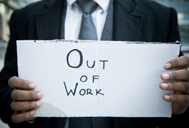Why Are There No Jobs?
 What is happening with job creation? The Heritage Foundation's James Sherk observed recently,
What is happening with job creation? The Heritage Foundation's James Sherk observed recently,
“While layoffs increased during this recession, they are not the primary cause of the nearly 10 percent unemployment rate. The main factor driving the unemployment rate so high during this recession was, and continues to be, the sharp drop in the creation of new jobs.
Government spending does not create jobs or prosperity, either. Washington should finally admit this fact and encourage private-sector investment and entrepreneurship — the best job creators that history has produced.”
Sherk makes the case that what we are witnessing is an economy where business leaders are simply refusing to hire people. Sherk observed,
“While unemployment has risen rapidly during this recession, the increase in jobless Americans has not been primarily due to job losses. Employers shed 2.6 million more jobs six quarters into the 2001 recession than they had six quarters (most recent data available) into the current recession. However, unemployment has risen much more in this recession than in 2001.”
Why?
What happened in 2001 recession that led employers to begin hiring quicker than today? The first is that in 2001, most businesses saw growth oriented policies being discussed including tax cuts for individuals and business. Today, the opposite is occurring as taxes are due to go up and even more taxes are being discussed. The specter of new health care mandates are about to hit over the next several years and Congress is now considering cap and trade legislation that will increase energy costs paid by businesses. There is nothing coming over the horizon that is growth oriented or going to lower the cost of business. Starting in 2011, business costs will go up, and it is only a question of how much.
Economic history shows how recovery can begin. Unemployment peaked at 6.3 percent after the 2001 recession and peaked at 7.8 after the 1990-1991 recessions. Conventional wisdom focuses on rising unemployment, but what is ignored is job creation. Unemployment actually rose more in past recession but job creation increased faster in past recessions. After the recession of 1991, growth occurred in 2002 as part of natural recovery but the economy took off in 1995 when Republicans took over Congress and more growth oriented policies were enacted by a bipartisan consensus. After the 1991 and 2001 recessions were over, recovery began quickly once growth oriented policies were enacted.
During a recession, labor forces continue to grow as job creation disappears, which makes finding new jobs harder while driving the unemployment rate up. Obviously, as job creations cease to happen or happen fast enough, unemployed workers stay unemployed longer, and this keeps the rate higher. While the focus is on those who lose their jobs, what we don’t talk about is job creation.
Understand the problems and you will have the right solutions. Mr. Sherk's theory is simple. If the problem is a low hiring rate, then the key is to encourage business to hire. The government solution during this present has been expansion of the public sectors at the expense of the private sectors! This has taken resources out of the private sector and as James Sherk notes, “Private investment falls sharply when government spending rises.”
With banks reluctant to loan and becoming more risk tolerant, businesses and individuals are failing to receive additional resources to expand. Both small businesses and large corporations are hesitant to expand and without expansion, future job creations become stalled. That is where we are right now.
The solution is not to expand government spending, taxes or mandates, but to reduce taxes and spending; allowing businesses the resources to expand. We are consistently told that we are going through the worst economy since the Great Depression and there is no doubt that the financial crisis of 2008 was serious. Yet, we have been through worse times but were able to recover quicker because different policy options were pursued. What we are seeing is a recovery being delayed and threatened by government policies that run counter to what has worked in the past. This administration is intent to increase its own power at the expense of the economy, and in the process, is ensuring that many workers stay unemployed longer while stalling a robust recovery that will last beyond 2011.



